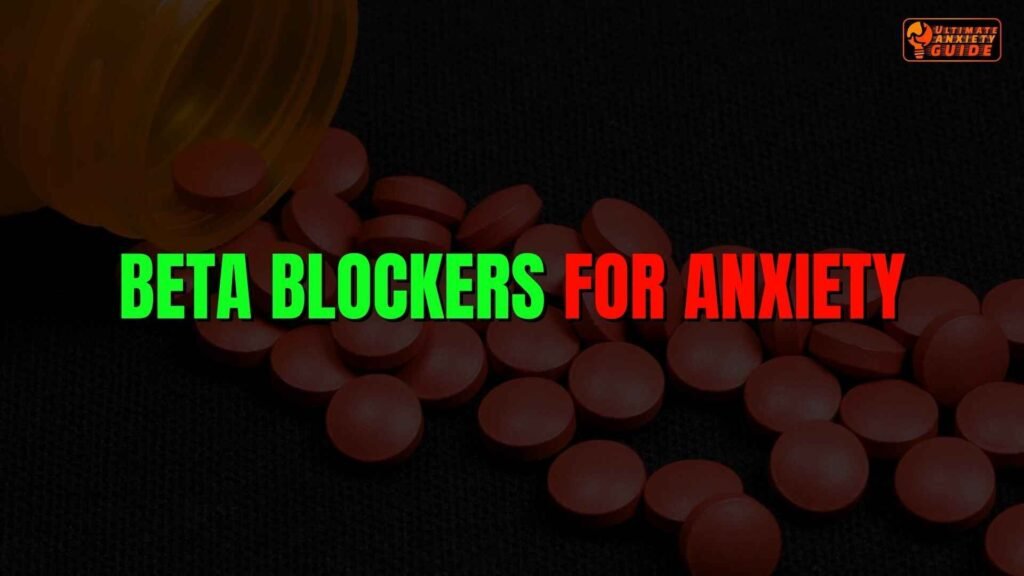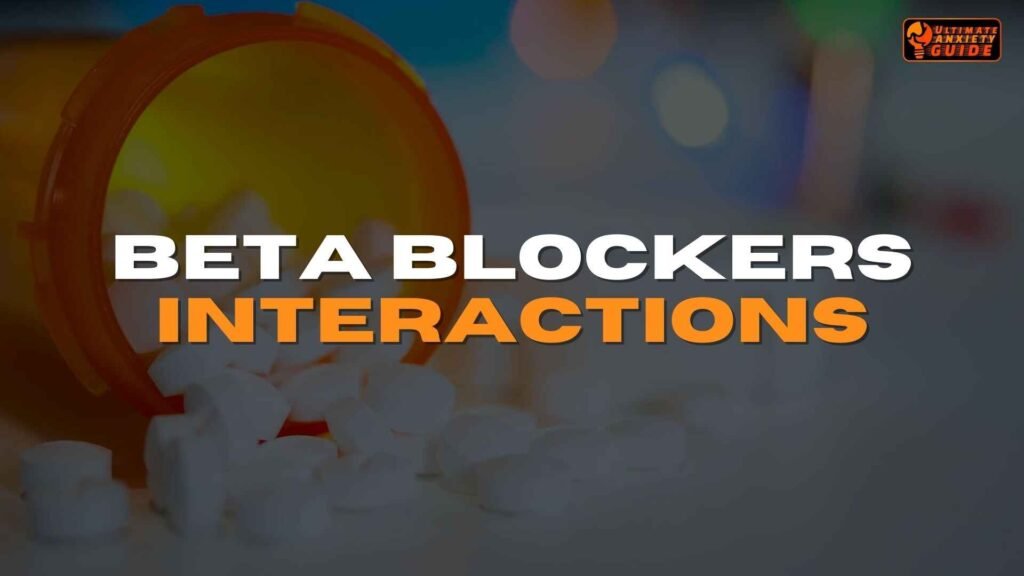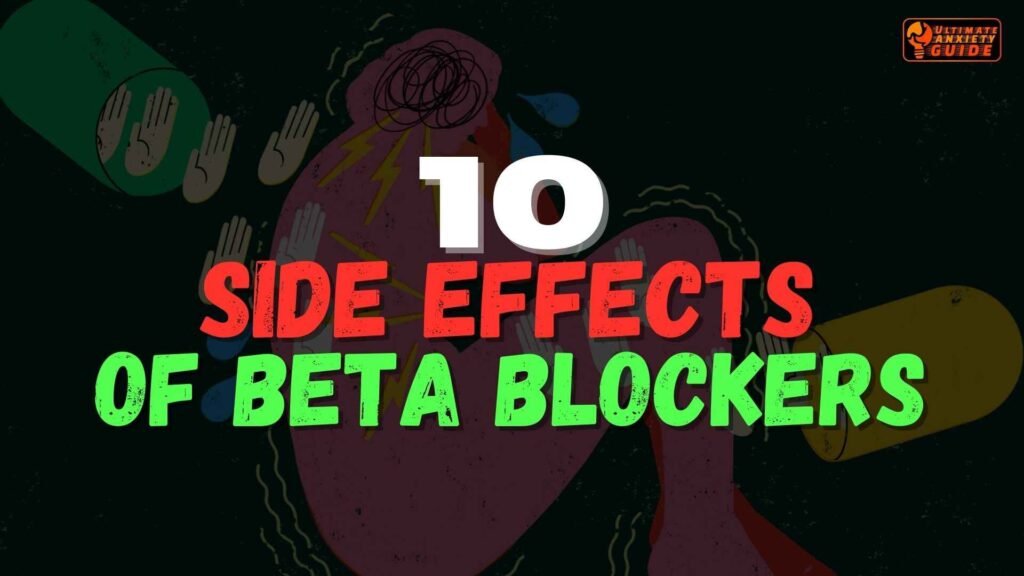Are you considering beta blockers for anxiety? If so, explore our 10 awesome benefits, from calming your nerves to enhancing sleep quality. Learn how to use beta blockers, tackle potential side effects, and explore exciting alternatives.
Feeling overwhelmed by anxiety and searching for some relief? I totally understand how challenging it can be. Anxiety can affect every part of your life, from your emotions to your physical well-being. Finding a treatment that truly works can make a huge difference. Beta-blockers for anxiety might be just what you need. Though these medications are commonly used for heart conditions, they’ve been shown to offer some awesome benefits for managing anxiety.
Okay, now, without further ado, let’s dig into all the details. Are you pretty much excited to learn more? Alright! Let’s get started!
What Are Beta Blockers?

Beta blockers, or beta-adrenergic antagonists, are medications designed to block the effects of adrenaline on your body. They work by slowing down your heart rate and lowering your blood pressure, which makes them really effective for treating conditions like high blood pressure and heart disease. By blocking adrenaline, beta blockers keep your heart from racing and your blood pressure from spiking.
But here’s something you might not know: beta blockers for anxiety can be incredibly useful for managing the physical symptoms of anxiety. If you’ve ever experienced a rapid heartbeat, excessive sweating, or shaking when you’re anxious, beta blockers can help calm these responses. They’re not a cure for anxiety itself, but they can make these physical symptoms much more manageable, helping you feel more comfortable and relaxed.
Common beta blockers like propranolol, atenolol, and metoprolol are often used to address anxiety symptoms. They can make a real difference by reducing the physical signs of anxiety so that you can handle stressful situations with greater confidence. If you’re curious about how beta blockers for anxiety might fit into your stress management plan, they could be a worthwhile option to explore.
10 Benefits of Beta Blockers for Anxiety

1. Reduce Physical Symptoms
Beta blockers for anxiety are remarkably effective in reducing the physical symptoms that often accompany anxiety. If you’re struggling with a rapid heartbeat, trembling, or sweating profusely, these medications can be a real lifesaver. By slowing your heart rate and dampening your body’s adrenaline response, beta blockers for anxiety help you feel more in control during stressful situations.
Imagine walking into a high-pressure meeting or stepping onto a stage with the confidence that your physical symptoms will be under control. Beta blockers for anxiety help ease those intense sensations of anxiety, making you feel less overwhelmed and more capable of managing your stress. This physical calm can translate into mental clarity, helping you handle pressure with greater ease.
2. Boost Confidence in Stressful Situations
Facing stressful situations, such as public speaking or high-stakes meetings, can be daunting for many. Beta blockers for anxiety can significantly boost your confidence by mitigating the physical symptoms that often undermine your self-assurance. By reducing symptoms like a racing heartbeat and trembling hands, these medications help you appear more composed and feel more confident.
Consider how it might feel to confront a challenging situation without the persistent worry of your anxiety symptoms taking over. With beta blockers, you can approach public speaking or other nerve-wracking scenarios with a calmer presence, enabling you to perform at your best and showcase your true abilities.
3. Improve Sleep
Anxiety often leads to restless nights, making it difficult to get the restorative sleep you need. Beta blockers for anxiety can be instrumental in improving your sleep by reducing the nighttime anxiety that interferes with your rest. This is especially valuable for those who find that anxiety affects their ability to fall asleep or stay asleep throughout the night.
Imagine getting into bed knowing that your anxiety won’t keep you tossing and turning. With beta blockers helping to manage your nighttime anxiety, you can enjoy a more restful and continuous sleep. This improvement in sleep quality can enhance your overall well-being and leave you feeling more refreshed each morning.
4. Avoid Addiction
One of the most significant benefits of beta blockers for anxiety is that they are non-addictive. Unlike some other anxiety medications that come with a risk of dependency, beta blockers provide a safer option for long-term use. This makes them a reliable choice for those who need ongoing anxiety management without the concern of developing an addiction.
Having the confidence that your medication isn’t addictive can bring peace of mind. With beta blockers, you can focus on managing your anxiety effectively without worrying about the potential for dependency, making them a sustainable and long-term solution for many people.
5. Lower Blood Pressure
Anxiety often contributes to elevated blood pressure, which can strain your cardiovascular system over time. Beta blockers for anxiety help address both anxiety and high blood pressure, supporting your overall cardiovascular health. By managing these aspects together, beta blockers reduce the strain on your heart and promote better heart health.
Imagine the benefit of having a medication that not only helps manage your anxiety but also helps keep your blood pressure in check. This dual action can contribute to a healthier cardiovascular system, making beta blockers a valuable tool for overall well-being, especially if you’re dealing with anxiety-related hypertension.
6. Decrease Panic Attacks
Panic attacks can be overwhelming and distressing, often characterized by intense physical symptoms. Beta blockers for anxiety can be effective in reducing the frequency and severity of these attacks. By addressing the physical symptoms that trigger panic attacks, these medications provide relief and help you manage these episodes more effectively.
Think about the relief of experiencing fewer panic attacks and having more control over your anxiety. Beta blockers can help you reduce the intensity and frequency of these challenging episodes, allowing you to navigate your daily life with greater ease and less fear.
7. Reduce Social Anxiety
Social interactions can be especially challenging for individuals with social anxiety, often intensified by symptoms like trembling and excessive sweating. Beta blockers for anxiety can help ease these symptoms, making social situations more manageable and less stressful.
Imagine how much more comfortable and confident you could feel in social settings with your anxiety symptoms under control. With beta blockers, you can participate in social interactions with less discomfort, making it easier to engage with others and enjoy social activities without the added stress of anxiety.
8. Work Quickly
One of the standout features of beta blockers for anxiety is their ability to provide rapid relief. Unlike some other medications that may take weeks to show effects, beta blockers for anxiety often start working within a few hours. This quick action can be particularly beneficial for managing intense anxiety symptoms when you need immediate relief.
Imagine having a medication that can act quickly to ease your anxiety. With beta blockers, you can experience faster relief from sudden episodes of anxiety, making you regain your calm and return to your daily activities with minimal interruption.
9. Stabilize the Heart
Anxiety can cause uncomfortable symptoms like heart palpitations and irregular heartbeat, which can be unsettling and disruptive. Beta blockers for anxiety help stabilize your heart rate, reducing these symptoms and making it easier to manage the impact of anxiety on your cardiovascular health.
Think of the comfort in knowing that your heart rate is more stable and your anxiety-related symptoms are under control. Beta blockers for anxiety can help reduce these troubling physical effects, contributing to a greater sense of calm and well-being.
10. Minimize Side Effects
When it comes to managing anxiety, beta blockers for anxiety are often preferred due to their relatively mild side effects compared to many other medications. This makes them a practical option for those seeking relief from anxiety without experiencing significant adverse effects.
Consider the advantage of a medication that offers effective anxiety management while minimizing unpleasant side effects. Beta blockers provide a more comfortable treatment experience, allowing you to focus on managing your anxiety effectively without additional discomfort.
How to Use Beta Blockers for Anxiety

Using beta blockers effectively involves:
- Dosage and Administration: Your healthcare provider will prescribe a specific dosage of beta blockers for anxiety tailored to your unique needs. It’s crucial to follow their instructions exactly. Taking the right amount helps ensure that the medication works effectively and safely. Your doctor knows what’s best based on your response to the medication, so stick to their guidance for the best results.
- When and How Often to Take: Beta blockers for anxiety are usually taken once or twice a day. Your doctor will set up a schedule that fits with your daily routine and anxiety management plan. To get the most benefit, take your medication at the same times each day. Consistency helps maintain steady levels of the medication in your system, which is key for managing anxiety effectively. Setting reminders or using a medication tracker can help you stay on track.
- Consulting Your Doctor: Always check in with your healthcare provider before starting beta blockers for anxiety. They will give you personalized advice on how to use the medication safely and effectively. Your doctor is there to answer your questions, adjust your treatment if needed, and ensure that the medication is working well for you.
Beta Blockers Interaction

Beta blockers for anxiety can interact with other medications you might be taking, so it’s essential to keep your doctor informed about everything you use, including over-the-counter drugs and supplements. Additionally, it’s a good idea to limit your alcohol and caffeine intake, as these can impact how well the beta blockers work.
Imagine beta blockers as part of a bigger team, where all your medications and lifestyle choices need to work together smoothly. By letting your doctor know about all your other medications and being mindful of alcohol and caffeine, you help ensure that your treatment for anxiety stays on track and works effectively.
Beta Blockers Alternatives
If beta blockers for anxiety aren’t quite the right fit for you, or if you’re exploring other treatment options, there are several alternatives that might be worth considering. Here are the alternatives:

- Lexapro (Escitalopram): Lexapro is a popular selective serotonin reuptake inhibitor (SSRI) that works by balancing serotonin levels in the brain. This can be effective for treating both anxiety and depression. If you’re struggling with anxiety and also find yourself dealing with feelings of sadness, Lexapro might be a good option to discuss with your doctor.
- Hydroxyzine Pamoate: Hydroxyzine is an antihistamine with sedative properties, which means it can help relieve anxiety symptoms. It’s often used for short-term relief, especially if you need something to help manage anxiety quickly without the long-term commitment of other medications.
- Pristiq (Desvenlafaxine): Pristiq is a serotonin-norepinephrine reuptake inhibitor (SNRI) that addresses both anxiety and depression by affecting neurotransmitters in the brain. If you’re dealing with anxiety and depression, Pristiq might offer a dual benefit, making it a potential alternative to beta blockers.
- Trazodone: While Trazodone is primarily used as an antidepressant, it also has the added benefit of helping with sleep disturbances that often accompany anxiety. If insomnia is a major issue for you along with anxiety, Trazodone could be worth exploring.
- Seroquel (Quetiapine): Seroquel is an antipsychotic that is sometimes used off-label to treat severe anxiety disorders. This medication might be an option if other treatments haven’t provided the relief you need.
- Doxepin: Doxepin is a tricyclic antidepressant that not only helps manage anxiety but can also address sleep issues. If you’re finding that anxiety is affecting your sleep, Doxepin might help you get better rest while managing your anxiety.
- Wellbutrin (Bupropion): Wellbutrin is an atypical antidepressant that can improve mood and alleviate anxiety symptoms. It’s different from other antidepressants in that it doesn’t have as much of an impact on serotonin, which might be beneficial if you’re sensitive to SSRIs or SNRIs.
- Gabapentin: Although Gabapentin is commonly used to treat nerve pain, it can also provide relief from anxiety. If you’re dealing with anxiety alongside chronic pain, Gabapentin might offer a dual benefit.
10 Common Side Effects of Beta Blockers

When using beta blockers for anxiety, it’s useful to know what side effects might come up and how they could impact you. Here’s a closer look at each common side effect and what it means for you:
1. Fatigue: Feeling unusually tired or lethargic is a common side effect of beta blockers for anxiety. You might find that despite getting a full night’s sleep, you still feel exhausted during the day. This tiredness can be more noticeable if your body is still adjusting to the medication. Engaging in light exercise and ensuring you get plenty of rest might help manage this fatigue.
2. Cold Hands and Feet: Beta blockers can cause your hands and feet to feel colder than usual. This happens because the medication can reduce blood flow to your limbs. If you’re experiencing this, wearing warm clothing and keeping your hands and feet well-covered can help you stay comfortable.
3. Dizziness or Lightheadedness: Experiencing dizziness or feeling lightheaded, particularly when standing up quickly, is another possible side effect. This occurs because beta blockers can influence your blood pressure. To avoid this sensation, try to rise slowly from a sitting or lying position and give yourself a moment to adjust.
4. Weight Gain: Some people notice an increase in weight while taking beta blockers. This can be due to changes in metabolism or appetite. If you’re concerned about weight gain, tracking your diet and staying active can help you maintain a healthy weight. Small adjustments in your lifestyle can make a big difference.
5. Depression: Feeling down or experiencing mood changes can sometimes occur with beta blockers. This might manifest as a sense of sadness or emotional low points. Engaging in activities that uplift your mood and connecting with supportive friends or family can help counteract these feelings.
6. Shortness of Breath: Difficulty breathing, especially during physical exertion, is another possible side effect. Beta blockers can sometimes affect your respiratory function. If you find it hard to breathe during activities, consider moderating your physical exertion and focusing on breathing exercises to help manage this issue.
7. Sleep Disturbances: Beta blockers can cause issues with sleep, such as trouble falling asleep or intense dreams. Creating a relaxing bedtime routine and maintaining a consistent sleep schedule can help improve the quality of your sleep. If sleep problems persist, adjusting your pre-sleep habits might provide some relief.
8. Digestive Issues: You might experience digestive problems like nausea, diarrhea, or constipation with beta blockers. These issues can be managed by eating a balanced diet and drinking plenty of fluids. Simple dietary adjustments can often help alleviate these symptoms and keep your digestive system in check.
9. Reduced Libido: A decrease in sexual interest or libido can be a side effect of beta blockers. This might affect your relationships and personal well-being. Exploring open communication with your partner and finding ways to maintain intimacy can be helpful. Addressing this issue with supportive practices can improve your quality of life.
10. Memory Problems: Difficulty with concentration or memory can sometimes occur. You might find it harder to focus or remember things as clearly. Engaging in memory-boosting activities, like puzzles or mental exercises, and setting reminders for important tasks can help manage these cognitive challenges.
10 Tips to Handle Beta Blockers Side Effects

When you’re on beta blockers for anxiety, managing any side effects that come up can make a big difference in how you feel. Here are 10 easy and friendly tips to handle these side effects and stay on top of your well-being:
1. Stay Hydrated: Drinking plenty of water is key to feeling your best while taking beta blockers for anxiety. Staying hydrated can help combat fatigue and dizziness, which are common side effects. Aim for about 8 glasses of water a day. Carrying a reusable water bottle with you can serve as a helpful reminder to drink more throughout the day.
2. Monitor Your Weight: Weight gain can sometimes happen with beta blockers. Keeping an eye on your weight can help you catch any changes early. Regularly checking your weight and eating a balanced diet can help manage this side effect. Incorporating fruits, vegetables, and lean proteins into your meals, along with staying active, can keep you on track.
3. Exercise Regularly: Moderate exercise is a great way to improve circulation and combat cold hands and feet, a possible side effect of beta blockers for anxiety. Aim for at least 30 minutes of physical activity most days of the week. Simple activities like walking, swimming, or yoga can make a big difference and help you feel more comfortable.
4. Avoid Rapid Movements: Dizziness or lightheadedness can occur, especially when standing up quickly. To avoid this, try standing up slowly and give yourself a moment to adjust. Moving gradually can help prevent sudden dizziness and keep you feeling steady.
5. Manage Stress: Mood changes and sleep issues are possible with beta blockers for anxiety. Managing stress through relaxation techniques like deep breathing, meditation, or gentle stretching can be really helpful. Creating a calming bedtime routine, such as reading or taking a warm bath, can also improve your sleep quality.
6. Eat a Balanced Diet: Digestive issues, such as nausea or constipation, can be managed by eating a balanced diet. Focus on high-fiber foods like whole grains, fruits, and vegetables. Avoiding heavy or fatty foods and drinking plenty of water can also support your digestive health and make you feel better overall.
7. Address Sleep Issues: If you’re having trouble sleeping while on beta blockers, try to create a relaxing environment before bed. Keeping your room cool and dark, and sticking to a consistent sleep schedule can help. Avoiding screens and caffeine in the evening can also improve your sleep quality.
8. Communicate Changes in Libido: If you notice a decrease in sexual interest, it’s important to address it. Open communication with your partner and finding ways to connect can be helpful. If this side effect is affecting you significantly, it’s worth discussing it with your healthcare professional to explore potential alternatives.
9. Use Memory Aids: Difficulty with memory or concentration can happen with beta blockers for anxiety. Using tools like planners, alarms, or apps to set reminders can help you stay organized. Breaking tasks into smaller, manageable steps can also make it easier to stay focused and on track.
10. Regular Check-ups: Regular check-ups with your healthcare provider are important while taking beta blockers. These appointments help you keep track of how well the medication is working and enable any necessary adjustments. Keeping up with these visits ensures that your treatment remains effective and suited to your needs.
Important Considerations

Before starting beta blockers for anxiety, it’s essential to think about your overall well-being and discuss any other medications or existing health conditions with your doctor. Since beta blockers can interact with different drugs, make sure your doctor reviews your current medications. They also need to know about any pre-existing health issues, like heart or lung conditions, to ensure that beta blockers for anxiety are a safe option for you.
Regular check-ins with your doctor are crucial to make sure beta blockers for anxiety are working as intended. These appointments allow you to talk about how the medication is affecting you, address any side effects, and make any necessary adjustments. Staying in touch with your doctor helps to adjust your treatment plan effectively and ensures you’re managing anxiety in the most safe and efficient way.
Conclusion
Beta blockers for anxiety can offer significant relief, tackling everything from physical symptoms like a racing heart to boosting your confidence in stressful situations and improving your sleep. These medications can be a valuable part of your strategy to manage anxiety, but it’s important to use them with the right guidance. Your healthcare provider will help you determine if beta blockers for anxiety are the right choice for you and will guide you in exploring other treatment options if needed.
Final Thoughts
Managing anxiety can be a challenging journey, and finding what works best for you might involve trying different treatments and making lifestyle changes. Beta blockers for anxiety can be an important piece of this puzzle, providing support and relief as you work through your symptoms. It’s crucial to collaborate closely with your healthcare team to create a personalized plan that fits your needs.
If you’re considering beta blockers for anxiety, have an open conversation with your doctor to see if they’re a good match for your situation. And remember, exploring various treatments and approaches can help you find the most effective path to feeling better. If you have any experiences or questions about beta blockers for anxiety, feel free to share them in the comments below!
Engage with Us
Alright, dear visitors,
That’s all from my end. As of now, I’d love to hear from you—share your thoughts and experiences in the comments below. For more mental health-related content and updates, stay in touch with Ultimate Anxiety Guide and keep connected. If you want to connect personally, feel free to email us at ultimateanxietyguide@gmail.com.
Thanks a trillion for your time and effort.
Happy Browsing!
FAQs
